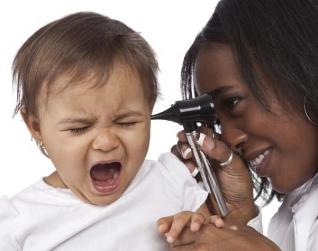Ouch! It's A(nother) Ear Infection
- Thursday, 13 November 2014 08:55
- Last Updated: Thursday, 13 November 2014 08:59
- Published: Thursday, 13 November 2014 08:55
- Stacie M. Waldman
- Hits: 6637
 By the age of three, 85% of all children will have had at least one ear infection. It is the number one reason parents bring their children to the doctor. Ear infections are most common in the colder months. I had the opportunity to speak with Dr. Erik Waldman, Assistant Professor of Pediatric Otolaryngology at Columbia-Presbyterian Hospital, who answered the most common questions that parents have about kids and ear infections.
By the age of three, 85% of all children will have had at least one ear infection. It is the number one reason parents bring their children to the doctor. Ear infections are most common in the colder months. I had the opportunity to speak with Dr. Erik Waldman, Assistant Professor of Pediatric Otolaryngology at Columbia-Presbyterian Hospital, who answered the most common questions that parents have about kids and ear infections.
I brought my kid to the pediatrician for another issue and he was diagnosed (again) with an ear infection. He has no symptoms. How is this possible?
The two most common types of ear infections are Acute Otitis Media (AOM) and Otitis Media with Effusion (OME). AOM is a symptomatic, infectious disease that causes pain, fever, and irritability and may require antibiotics. OME, however, is non-infectious and is characterized by a build up of fluid in the middle ear. (A pediatrician may be able to diagnose fluid in the ear even though the child is seemingly asymptomatic.) OME may be of concern as it is the main cause of speech delay in children. It usually resolves itself within a month and a half but if fluid persists, your child should have his or her hearing tested by a certified audiologist. You may also consider bringing your child to a pediatric otolaryngologist for an evaluation.
When should I suspect an ear infection in my baby? He can't verbalize that his ear hurts.
Ear infections (and fluid in the ear) are usually followed by a sore throat, cold, or upper respiratory infection. Signs and symptoms of an ear infection in a baby include:
• Tugging at the ear
• Fussiness and crying
• Fever
• Difficulty sleeping
• Fluid draining from the ear
• Trouble hearing or responding to sounds
• Balance issues
If your baby is exhibiting any or all of these signs and symptoms, they should be brought to the pediatrician for a check up and a diagnosis.
What is the treatment for an ear infection?
The American Academy of Pediatrics (AAP) recently revised the guidelines around treating ear infections. The 2013 guidelines state: Antibiotics should be administered for severe cases of acute otitis media in one or both ears for children ages six months and up based on ear pain that is moderate to severe, lasts for at least 48 hours, and is accompanied by a temperature of 102.2 F or higher. For less severe cases or if a definitive diagnosis cannot be made, the patient should be monitored for two to three days (called "watchful waiting") before starting antibiotics. After 48-72 hours, antibiotics should be initiated if symptoms don't improve.
If left untreated, AOM can lead to serious complications such as meningitis, facial paralysis, or eardrum perforation and I've seen all of these complications in my practice.
For otitis media with effusion (or fluid in the ear), the only treatment is to wait it out to see if it goes away -- and if it doesn't -- I highly recommend a visit to an otolaryngologist to discuss other options. Otolaryngologists are doctors that are specially trained in ear, nose, and throat issues and are surgeons by trade. Pediatric otolaryngologists are fellowship trained for an additional one to two years subspecializing in pediatric ear, nose, and throat surgery. Many pediatric otolaryngologists work at hospitals that employ pediatric anesthesiologists; this may be another consideration if your child is a surgical candidate.
Natural "remedies" such as various oils do not have data backing their use and may be ineffective, cause a delay in treatment, or even cause more harm than good.
Can I actively do anything to prevent ear infections in my child?
There's a lot of misinformation on the Internet about ear infections. (Eating dairy and gluten does not cause ear infections, so do not eliminate these staples from your child's diet- there's no science behind it.) There are a number ways to reduce your child's risk of ear infections that are backed by scientific studies:
• Vaccinate your child (studies show vaccinated children get far fewer ear infections than children who aren't vaccinated)
• Don't smoke around kids (this is associated with a higher rate of ear infections)
• Do not give your child bottles during naps or at night
• Avoid contact with sick kids and wash hands often
When is surgery indicated?
There are two main indications for surgery. The first is recurrent acute otitis media- if a patient has too many, too frequent, or too severe ear infections. The second is the continuous presence of fluid in the ear.
For more information visit these two sites:
New Guidelines on Treating Ear Infections in Children
NIH Ear Infections







